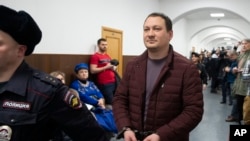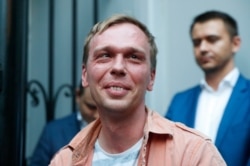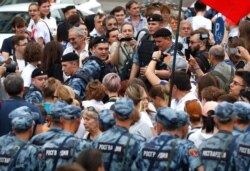Moscow police have charged five former officers with fabricating evidence against a leading Russian journalist, adding a twist to a press freedom case that captured international headlines.
Ivan Golunov, an investigative journalist for the online Meduza portal, was arrested on what were widely seen as trumped-up drug possession charges in June 2019.
There were immediate suspicions the arrest was tied to his work: the journalist was well-known for investigative stories that looked into corruption in city government, business and mafia circles.
Russia’s journalism community quickly rallied to his support, launching a media campaign that triggered large street protests in Moscow.
Amid growing public pressure, Golunov was released and the charges dropped. Several officers involved in the arrest were also dismissed amid the initial fallout from the case.
Yet, in the ensuing months, Golunov and Meduza have complained that authorities have shown little interest in investigating who ordered police to plant drugs and who attempted to silence the journalist.
And while those remain open questions, Russian President Vladimir Putin said arrests were forthcoming when asked about the case during an annual press conference in December.
On Wednesday, Russia’s Investigative Committee made good on that promise, posting a statement to its website that five former officers “who initiated the illegal criminal investigation into Ivan Golunov” would be charged.
Russian media reports later said the former officers had been accused of illegal purchase and possession of narcotics as well as fabrication of evidence.
"The criminal charges, which I long sought and received with the help of the media and society, have been issued, and that’s very good,” Golunov told reporters. "We hope this will go before a court that will give its judgment on the events that occurred.”
A suspicious arrest
From the beginning, the case against Golunov stretched all reasonable belief.
Plainclothes officers claimed they discovered the banned "club drug" mephedrone in the reporter's backpack when Golunov was stopped while on his way to a meeting with a source in downtown Moscow in June 2019. Police later said a massive stash of the narcotic was discovered during a search of the journalist’s apartment.
Golunov’s friends and colleagues were immediately skeptical. Golunov, they pointed out, was among Russia’s best investigative journalists — famously cautious and known for a sober lifestyle. Moreover, police had refused the journalist’s offers to take hand swab tests for evidence of mephedrone.
Photos later published by police showed what they alleged were drug paraphernalia and chemistry lab equipment in the journalist’s home. The problem? Close friends said none of the pictures remotely resembled Golunov’s apartment.
A public pressure campaign quickly went into action.
Russia’s major newspapers agreed to publish identical front pages calling for Golunov’s freedom, and hundreds of protesters took to the streets.
Faced with an angry public and flimsy evidence, authorities released Golunov and walked back what had been fraudulent charges.
Others inspired
The outcome has galvanized Russian civil society and activists hoping to take on government injustice and beat the odds.
Seemingly every protest in the past year — from environmental movements against trash dumps to support for detained journalists to rallies against illegal property seizures — has adopted the banner designed during the Golunov case, substituting “We are/I am Ivan Golunov” with the cause of the day. The message seemingly: "If Golunov won, why can’t we?"
Yet Golunov’s victory remains the exception, not the rule.
Sentencing on narcotics charges remains widespread, with accusations of police planting evidence being common.
Meanwhile, observers noted that while Golunov had been spared, several demonstrators had been far less fortunate after facing arrest amid what proved to be a summer of rolling protests in Moscow.
"Once the joy has left our throats and we calm down, it would be good to take a glance over at the next courtroom, where parallel to Golunov, other … hearings were being held,” wrote Matvei Ganapolsky, a longtime commentator on the influential Echo of Moscow radio station.
"There, Russia’s lying justice system gave young people real sentences and they’re now behind bars,” added Ganapolsky.
His point? Golunov was spared because people came out in his defense.






